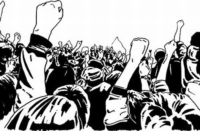When people are discussing happiness, there are few things that come to mind as immediately as freedom and autonomy. As Starbucks said, “happiness is in your choices.” We are told that without freedom we cannot be happy, and that freedom, boiled down to the basics, simply means choice.
This narrative has become central to the consumerism necessary for the capitalist system. Freedom becomes confined to choice, and those choices are then confined by capitalism, which occasionally makes normally rational people start defending the notion that to have only one brand of milk, or phone or bus service available would crush some essential part of us and make us incapable of joy, no matter their price or quality. It’s also a very easy way to introduce and normalise the privatisation of services. Competition! Choice! Better for consumers!
The logic follows that the more choices available the greater the number of people to make the most appropriate choices for themselves, maximising individual freedom and therefore happiness. Capitalism relies on the perpetuation of this notion of choice and the concept of consumption-happiness in order to keep us buying one brand over the other.
The delicious irony is that having multiple brands to choose from creates more anxiety about choosing correctly, rather than reassuring consumers about their freedom or choice validity. That most choices are probably owned by the same parent company is overlooked. The illusion of variety is the ersatz spice of life.
This choice-happiness dynamic is not one based on a desire for a better outcome for a greater number of people, or the natural order of things: it is simply a nice tidy way to reinforce market norms.
In experiments comparing the different understandings of choice by citizens from the former Soviet republics and the United States, participants were offered a drink: Coca-Cola or Pepsi. They were then asked what the options had been. The majority of former USSR participants answered that (excuse the Americanism) it had been “soda or no soda.” This pattern didn’t change after five more soda options were added to the original two. Only when coffee and blackcurrant juice were offered did the choice seem to expand: to soda, coffee, blackcurrant, or nothing.
The American participants had registered each soda option as a choice of its own, and had not registered the possibility of choosing nothing. They were also much more likely to be upset when their chosen option was not available, or when given a different drink from what they requested.
The experiment occasionally misattributed the response of the former USSR participants to unfamiliarity with the products, unfamiliarity with self-expression, or an acceptance of disappointment, all of which are inaccurate and insulting biases of the American researchers. From other research we can see that the people of the USSR had a much higher engagement in political activity and in work-place decisions, where the choices were of greater value and impact than types of fizzy drink.
The science about choice is fuzzy. Like that about attraction, we can only make broad generalisations: in western society, blonde hair in women is seen as an attractive feature. And, like the research done with attraction, for a person to actively participate in a choice an attractive appearance isn’t enough without an emotional connection.
This is why the rivalry between Coke and Pepsi is a fantastic marketing strategy for both of them: people are forced to take sides, and the Coke-Pepsi false dichotomy becomes a part of their identity. Sporting brands are particularly talented at insinuating themselves with consumers. Give people enough time and they start to tell themselves stories of why brand X is the only choice for them. They will do so under the impression that they have never been influenced by any advertising at all.
The loveliest trick of the Devil is to persuade you that they don’t exist—a lesson advertising has taken to heart. It is so ever-present that it has become almost invisible. Last month’s article on late-stage capitalism covered the hypocrisy of this brand image and the practical realities of support for the said brand through the Kaepernick and Nike fiasco.
But there is a more sinister undertone in this message that reaches outside consumer goods. The dogma of choice is edging into medical decisions. Psychologists have studied this paradox of choice with regard to cosmetic surgery, where the notion of choice has pushed up the number of women seeking elective surgery, the normalisation of which further pushes other women to likewise volunteer themselves for the knife.
The same has happened with companies that offer oocyte cryopreservation, or “egg-freezing,” and, ironically, in reverse with vaccinations: take-up has fallen. In moving vaccinations from mandatory to optional, the notion that all opinions are equally valid has been steadily reinforced. Health has become a life-style choice.
Professor Baba Shiv has written a number of papers on the de-professionalisation of medicine, and how the transformation of medical care in the United States into a service model now has patients with no medical experience directing their own care, occasionally to their own detriment. Those choices are again as dictated by finance, as are all other consumer choices.
The same methodology can be applied to elections; and when it works it is seamless. A weak, middle-of-the-road candidate will generally do better if competing against the particularly vile. When this goes wrong and the racist or homophobic or sexist or any amalgamation of these right-wing ideologies wins, voters themselves are commonly blamed for being too stupid to vote otherwise.
Again the system does not have to acknowledge its own failures: the creation of a base of support for the right-wing candidate, the awful weaknesses of the supposed left candidate (and this concept of left never becomes as flexible as it does during elections), or the system that promotes this laughable version of democracy but in fact buys in to the same individualisation of myth-building perpetuated by advertising.
Like buying a phone and realising that you got a bad deal, the problem, you are told, is not the phone, the company that makes it or the capitalist system that encourages a predatory sales technique but rather your own inability to find a bargain, to navigate through the technical specs, the jargon, pushy sales staff, built-in obsolescence, and your own financial realities.
Choice does lead to more happiness, up to a certain point, but it’s never linear or clear-cut; and, given increasing and unnecessary choices, we become more and more miserable.
Happiness under capitalism is an illusion as much as the choice it is contingent upon. The solution to this problem is clear: we must stop “choosing” capitalism.






